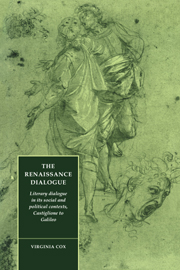 The Renaissance Dialogue
The Renaissance Dialogue Book contents
- Frontmatter
- Contents
- Preface
- 1 Problems of method
- 2 History and invention in the dialogue
- 3 The uses of the dialogue in sixteenth-century Italy: celebration and control
- 4 The uses of the dialogue in sixteenth-century Italy: commerce and courtesy
- 5 Castiglione's Cortegiano: the dialogue as a drama of doubt
- 6 The changing form of the Italian Renaissance dialogue
- 7 The theory and practice of the dialogue in Counter-Reformation Italy
- 8 From the ‘girevole strada’ to the straight and narrow path
- 9 From the open dialogue to the closed book
- Notes
- Bibliography
- Index
- Frontmatter
- Contents
- Preface
- 1 Problems of method
- 2 History and invention in the dialogue
- 3 The uses of the dialogue in sixteenth-century Italy: celebration and control
- 4 The uses of the dialogue in sixteenth-century Italy: commerce and courtesy
- 5 Castiglione's Cortegiano: the dialogue as a drama of doubt
- 6 The changing form of the Italian Renaissance dialogue
- 7 The theory and practice of the dialogue in Counter-Reformation Italy
- 8 From the ‘girevole strada’ to the straight and narrow path
- 9 From the open dialogue to the closed book
- Notes
- Bibliography
- Index
Summary
Though it is generally acknowledged to be one of the most characteristic literary forms of the Renaissance, the dialogue remains curiously invisible in the literary history of the period. A small number of isolated master pieces have, of course, attracted their share of attention, but there have been few attempts to grasp the phenomenon of literary dialogue as a whole, and what critical observation there has been has all too often been limited to vague diagnoses of the dialogic Zeitgeist of the age. It is as though this awkwardly hybrid genre – for Tasso, a union between poetry and dialectic – has slipped through the gap between philosophy and rhetoric which was already beginning to open up during the period in question and which is only now beginning to close.
Within this panorama of general neglect, a particularly untended area has been the social history of the dialogue. The concerns of most critics who have touched on the genre have tended to be either formal or epistemological; the dialogue is scrutinized as a work of art or a vehicle for thought. My aim in this book has been to examine the dialogue as an act of communication: to restore this most sociable of literary genres to the social matrix within which it was produced.
This book makes no claims to be a comprehensive history of the Italian dialogue in the period under consideration.
Information
- Type
- Chapter
- Information
- The Renaissance DialogueLiterary Dialogue in its Social and Political Contexts, Castiglione to Galileo, pp. xi - xivPublisher: Cambridge University PressPrint publication year: 1992